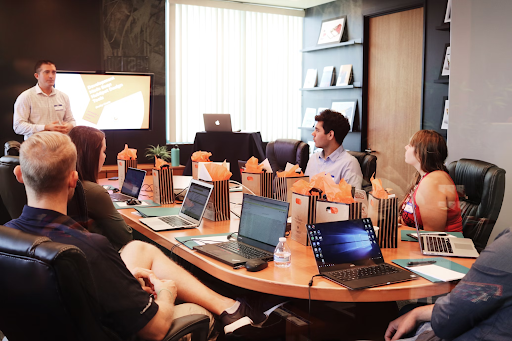
People buy from people with great product knowledge training
Irrespective of the customer’s circumstances or buying environment, purchase decisions and the sales process can be a long drawn out affair. Before a customer even thinks about parting with their hard earned cash, they’ll need certain assurances about the product, brand or even the salesperson.
In addition to price and quality, other factors like warranty information, financing, availability and shipping will also come into play. However, several purchases hinge on factors such as familiarity, confidence and trust, which often boils down to how competent and knowledgeable sales staff are.
From impulse buys to major purchases, passing on some product knowledge to the customer can potentially make or break a sale. If employees do not know about the boons and benefits of particular goods or services, chances are the consumer won’t convert. Therefore, some training or tuition is usually required.
If the employee has an interest in the industry or product, this becomes a lot easier. Their engagement levels and willingness to learn are bound to be high while previous knowledge could also be beneficial. But if staff have no skills or expertise about your business’ portfolio, things are much trickier. Even so, teaching existing or new employees is imperative in most retail settings, as it has been proven that people buy from people with great product knowledge.
Knowledgeable staff make more sales
Take a guess at how many more sales an employee with product knowledge makes compared to a member of staff with little to no expertise? 10%? 25%? Perhaps even 50%? With an abundance of product and brand information online, it isn’t difficult for consumers to go on the Internet and do some research. They’ll probably find what they’re looking for in no time and continue with the purchase even if employee knowledge is lacking right? Wrong!
According to research, retail sales associates with strong brand expertise sell 87% more than peers without out. That’s on the brink of twice as many sales. Imagine how much more successful your business would be if staff were able to sell double the number of products in a day.
However, even if a consumer decides to conduct some prior research, it is important to remember not everybody has instant and immediate access to product information. Despite the rise online shopping, numerous individuals prefer to visit physical stores and speak to another human being face-to-face. They will be putting complete faith in what the salesperson says and if the product doesn’t live up to expectations, you could be dealing with a backlash or several complains.
Research also indicates that when entering a store, 50% of customers are looking for expert advice on what to buy while a further 73% say product knowledge is what they need most from a sales associate. This level of expectation means that retail or sales staff simply cannot shy away or improvise with what they’re telling the customer. As a result, comprehensive training or teaching is needed.
Potential issues with sales and retail training
Taking these statistics into consideration, it seems like a foolproof idea to train up staff with as much brand and product information as possible. Regardless of the level of investment required, tuition and teaching is sure to be worth it in the long run. However, this is easier said than done.
In spite of the fact that retail employs roughly 14.4 million people in the US alone, it also has the highest rate of staff turnover. Numerous individuals that enter this line of work consider it to be a stopgap or stepping-stone to something better and are therefore unconcerned or indifferent to acquiring new knowledge and expertise. Likewise, one in five sales staff leave their jobs each year, with the cost of filling these vacancies costing tens of thousands of pounds.
Then there is the issue of training itself. Traditionally, this takes place in a backroom or office over the course of a day. If lots of teaching is required, then it might be more beneficial to send staff on a weekend course. But constantly being bombarded by masses of information in such a short space of time does not help employees learn. If anything, it will cause more harm than good.
They could easily become bored or disillusioned, focus their attention elsewhere, forget everything they were taught and not improve sales in the slightest. Add into the bargain the time they were away from the sales floor and this type of training becomes an incredibly expensive and pointless exercise.
Teaching product knowledge the right way
In the past, Wranx has worked with numerous companies that need to teach staff in-depth details about products and services. But rather than approaching this in the traditional sense, we believe that advanced learning through speed retention is the most effective way of teaching people new skills and expertise.
Essentially, we provide an employee with short quizzes about certain subjects or topics, in this case product information. By giving each member of staff a series of 10 questions each day, they gradually build up their knowledge base and become better sales people. And rather than plucking responses out of the air, we give employees the correct answer too. This is because speed retention works best when an individual tells us how well they know an answer. We can then schedule easier or more difficult questions accordingly to make sure all bases are covered.
Another part of our training solution is that employees can learn whenever and wherever they want. It is available on a range of devices including smartphones and tablets, enabling staff members to pick up and put down their tuition at a time and place that suits them. In theory, they never need to leave the sales floor.
It is in every business’ best interests to provide employees with as much product knowledge training as possible. Even if differing attitudes and techniques towards learning exist, there are certain solutions that guarantee positive results can be achieved for each and every salesperson or retail associate


